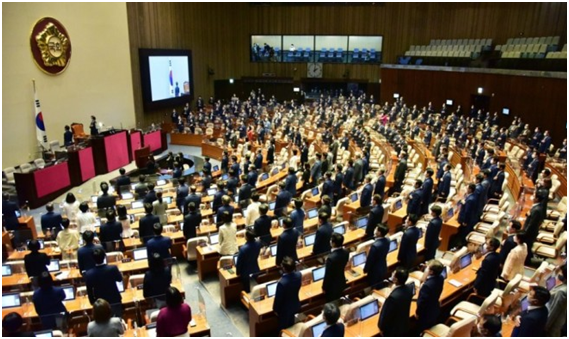Bills Likely to Result in 'Shareholder Dictatorship'

Three bills for corporate regulation will be submitted to the National Assembly late this month.
The South Korean government is planning to submit amendments to the Monopoly Regulation and Fair Trade Act, the Commercial Act and the Financial Group Supervision Act to the National Assembly late this month.
Experts point out that the bills are likely to result in so-called shareholder dictatorship through strengthening of shareholder democracy, reduced rights of major shareholders, disappearance of minority shareholders and financial investment capital filling the vacuum. “The original purpose of the bills is minority shareholder protection, but what is likely to occur is weakened management rights and more influence from foreign and institutional investors,” one of them mentioned.
The side effects of shareholder dictatorship have already been witnessed in some countries that adopted a higher level of shareholder democracy. According to the Korea Economic Research Institute, 10 activist funds attacked 48 global enterprises back in 2014 and the enterprises’ growth, profitability and many other indices deteriorated in 2015.
Specifically, their employment fell 4.8 percent and 18.1 percent in 2014 and 2015, respectively. Likewise, their capital expenditures fell 2.4 percent in 2014 and dropped 23.8 percent in 2015, R&D investment was maintained in 2014 and plummeted 20.8 percent in 2015, and net profit plunged 46.2 percent and 83.6 percent, respectively.
Meanwhile, the enterprises substantially increased their share buyback and dividend payment. To be specific, the treasury shares increased 7 percent to 8 percent year on year before the interference but 20.3 percent in 2014. The payment jumped 63.8 percent during the interference, too. Although the payment decreased after the attack, the net profit plummeted more than that to cause a payout ratio of up to 397 percent.
"South Korea carried out the most intensive conglomerate reform in the world during the 1997 Asian financial crisis, and yet the society has been polarized more and more,” said professor Shin Jang-seop at the National University of Singapore, adding, “This is because the reform was a shareholder-oriented one focusing on short-term corporate profits.”
KAIST professor Lee Byung-tae expressed concerns over inefficiency in the use of resources. “Entrepreneurs now have to concentrate their resources and efforts on retaining control and resort to expedients instead of studying how to survive in the global market, which has nothing to do with entrepreneurs in other countries,” he said.


